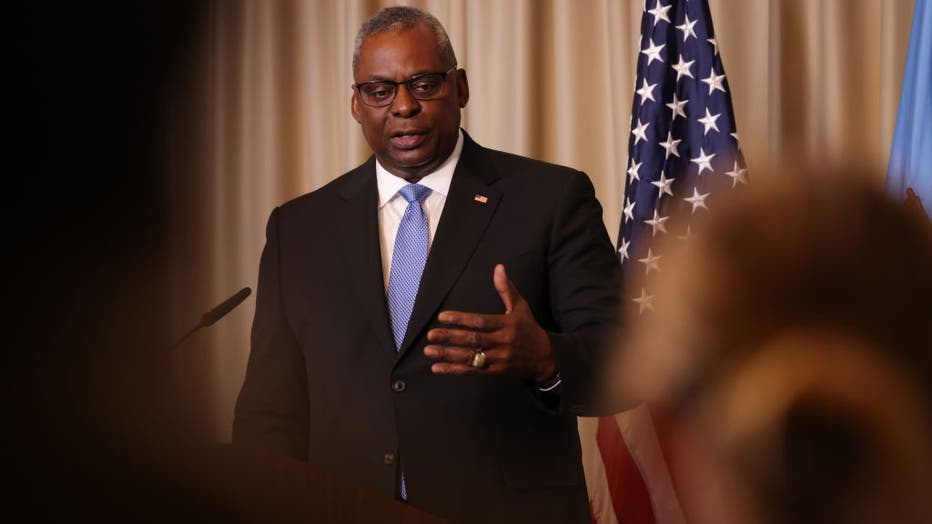Secretary of Defense Lloyd Austin undergoes prostate cancer surgery, White House unaware until days later
Defense Secretary Lloyd Austin undergoes prostate cancer surgery, White House unaware until days later
Defense Secretary Lloyd Austin has prostate cancer, and his recent secretive hospitalization was for surgery and later to treat a urinary tract infection related to that operation, his doctors said Tuesday.
WASHINGTON - Defense Secretary Lloyd Austin has prostate cancer, and his recent secretive hospitalization was for surgery and later to treat a urinary tract infection related to that operation, his doctors said Tuesday.
The cancer revelation answers the main question about Austin’s hospitalization, which has now lasted eight days. But it may only add to questions of accountability, since President Joe Biden only learned about the cancer diagnosis on Tuesday, even though it was made about a month ago.
"Nobody at the White House knew that Secretary Austin had prostate cancer until this morning," said John Kirby, the National Security Council spokesman. "And the president was informed immediately after."
The 70-year-old Austin was admitted to Walter Reed National Military Medical Center on Dec. 22 and underwent surgery to treat the cancer. He developed the infection a week later. Biden and other senior administration officials were not told for days about his hospitalization or his cancer.
According to the doctors, the cancer was detected when Austin had a regular screening in early December. They said he "underwent a minimally invasive surgical procedure" and went home the next day. But on Jan. 1 he reported nausea and severe abdominal, hip and leg pain due to the infection.
They said his prostate cancer was detected early, and his prognosis is excellent.
The cancer revelation comes after days of persistent questions about Austin’s hospitalization and the delays in notifying key leaders. And it raises more questions about the transparency and truthfulness of the Defense Department, which for the past four days said he was initially at Walter Reed for a "minor elective medical procedure," and not prostate surgery.
Asked about that choice of wording, Maj. Gen. Pat Ryder, Pentagon press secretary, said in a briefing on Tuesday that it was developed in consultation with Austin’s doctors.
When pressed on the delays in public notification, Ryder said, "Despite the frequency of prostate cancer, discussions about screening, treatment and support are often deeply personal and private ones." It was still not clear Tuesday how this will affect Austin’s job, travel or other public engagements going forward. Deputy Defense Secretary Kathleen Hicks is expected to take on some of his day-to-day duties as he recovers.
The lack of transparency about Austin’s hospitalization —- including the failure to tell Biden and other top officials about it or the reason for it for days — has triggered sharp criticism.

RAMSTEIN-MIESENBACH, GERMANY - SEPTEMBER 19: U.S. United States Secretary of Defense LLoyd Austin speaks to the media following the 15th meeting of the Ukraine Defense Contact Group at Ramstein Air Base on September 19, 2023 in Ramstein-Miesenbach, G
Austin spoke with Biden on Saturday, the same day he issued a public statement saying he recognized he could have done a better job insuring the public was informed about his hospitalization, and said "I commit to doing better." He did not, however, tell the president in that phone call that he had cancer.
When news breaks, stream FOX 5 DC anytime. Get the FOX Local app on your smart TV.
Several Republican lawmakers even said Austin should be ousted. And, earlier Tuesday, the White House chief of staff ordered Cabinet members to notify his office if they ever can’t perform their duties.
Dr. John Maddox, trauma medical director, and Dr. Gregory Chesnut, director of the Center for Prostate Disease at Walter Reed, provided the first details of Austin’s prognosis in a statement put out by the Pentagon. They said he was under anesthesia during the initial surgery, and when he went to intensive care on Jan. 2 the infection had triggered an intestinal backup and his stomach had to be drained with a tube in his nose.
The Associated Press contributed to this report.



